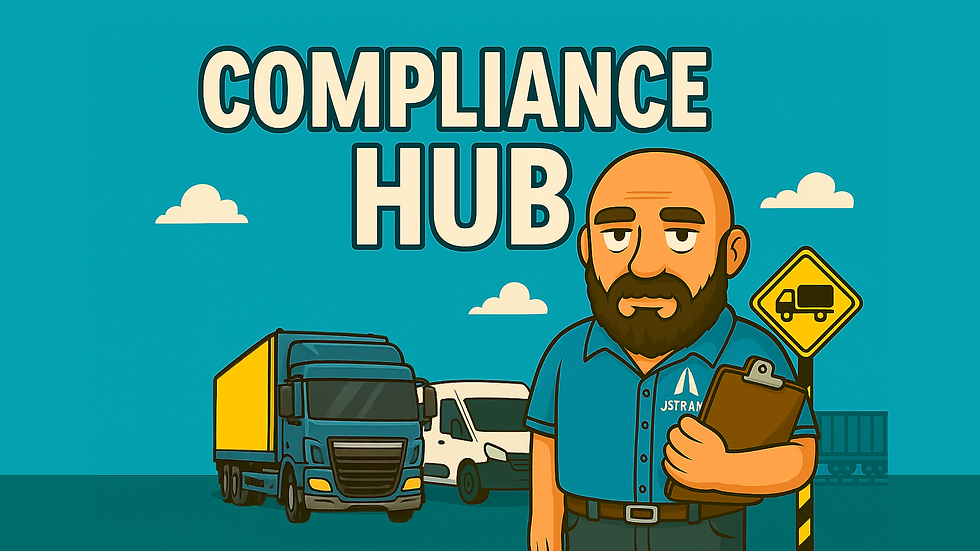

2. Legal Responsibilities of Operator Licence Holders
Operating commercial vehicles under a UK Operator’s Licence comes with a series of legal obligations that go far beyond simply keeping vehicles roadworthy. Whether you’re a small business owner running a single van or a fleet of HGVs, holding an Operator Licence (O-Licence) places you under the scrutiny of both the Traffic Commissioner and the Driver and Vehicle Standards Agency (DVSA).
This guide outlines your core legal responsibilities as an Operator Licence holder — particularly relevant for Restricted Licence holders — and highlights practical steps to ensure you remain compliant.
1. Understanding Your Licence Type and Its Limitations
If you hold a Restricted Operator Licence, you are only permitted to use your vehicles to carry your own goods in connection with your own business. You cannot carry goods for hire or reward.
You must:
-
Ensure that all vehicle use is directly related to your own business activities.
-
Never subcontract or accept paid work from third parties using your own transport.
👉 [Related Blog: “Restricted vs. Standard Operator Licence: What’s the Difference?”]
2. Fulfilling the Undertakings Given to the Traffic Commissioner
When you applied for your licence, you made formal undertakings, including:
-
Keeping vehicles and trailers in a fit and serviceable condition.
-
Ensuring drivers comply with tachograph and working time rules (where applicable).
-
Maintaining proper records and documentation.
-
Notifying the Traffic Commissioner of any material changes (e.g., business address, operating centre).
Failure to comply with these undertakings can result in penalties, including licence suspension or revocation.
👉 [Guide Download: “Undertakings Checklist for Operator Licence Holders”] (Post Coming Soon)
👉 [Blog: “What Happens at a Public Inquiry – and How to Avoid One”].
3. Vehicle Maintenance and Safety Standards
You have a legal duty to ensure that all vehicles used under your licence are safe, roadworthy and regularly maintained.
This includes:
-
Creating a documented maintenance schedule.
-
Keeping records of inspections, repairs, MOTs, and defect reports.
-
Using a qualified technician or workshop.
👉 [Blog: “How to Set Up a Maintenance System for Your Fleet”].
👉 [Download: Vehicle Maintenance Record Template]. (Post Coming Soon)
4. Record Keeping and Documentation
You are legally required to keep accurate and up-to-date records for a minimum of 15 months, including:
-
Maintenance records
-
Driver licence checks
-
Vehicle defect reports
-
Tachograph data (where applicable)
-
Operating centre details
👉 [Blog: “What Records Do You Need to Keep for Your Operator Licence?”].
👉 [Checklist: Operator Licence Compliance Documents – What to Keep and How Long”] (Post Coming Soon)
5. Driver Responsibilities and Oversight
Even if you don’t employ drivers directly, you are responsible for ensuring any drivers of your vehicles:
-
Hold the correct category of licence
-
Are fit to drive and properly trained
-
Comply with working time and driving hour regulations
-
Conduct daily walkaround checks
As an Operator Licence holder, you can be held liable for offences committed by your drivers.
👉 [Blog: “How to Manage Driver Compliance Without a Transport Manager”].
👉 [Download: Daily Walkaround Check Sheet]. (Post Coming Soon)
6. Operating Centre Conditions and Changes
Your operating centre(s) must be:
-
Secure and suitable for the size and type of vehicles operated
-
Large enough for safe parking and manoeuvring
-
Located in an area where no local objections or restrictions apply
You must notify the Office of the Traffic Commissioner of any change to your operating centre, or if you move premises.
👉 [Blog: “How to Get Approval for a New Operating Centre”]
7. Reporting Changes and Convictions
By law, you must promptly report to the Traffic Commissioner any:
-
Changes in business structure or address
-
Criminal convictions or penalties (personal or business-related)
-
Changes in financial standing
-
Bankruptcy or insolvency
Failing to report can be viewed as deliberate concealment and may lead to serious regulatory consequences.
👉 [Blog: “When Must You Notify the Traffic Commissioner?”].
👉 [Guide: What to Do if Your Business Changes – Licence Amendments Explained] (Post Coming Soon)
8. Financial Standing Requirements
To hold an Operator Licence, you must be able to demonstrate that you have sufficient financial resources to maintain your vehicles. The minimum financial standing for a Restricted Licence (as of 2025) is:
-
£3,100 for the first vehicle
-
£1,700 for each additional vehicle
Evidence may be required at application, review, or during an investigation.
👉 [Blog: “How to Prove Financial Standing for Your Operator Licence”].
9. Working Without a Transport Manager (Restricted Licence)
Unlike a Standard Licence, a Restricted Licence does not require you to appoint a professionally qualified Transport Manager. However, you are still legally responsible for every aspect of compliance.
This means:
-
You should have a working knowledge of transport law
-
You should invest in periodic training or consultation
-
You are personally accountable for all failings
👉 [Blog: “Do I Need a Transport Manager for a Restricted Licence?”].
👉 [Service: Compliance Coaching for Restricted Licence Holders].
10. Staying Audit-Ready
Operators can be inspected by the DVSA or called to a Public Inquiry by the Traffic Commissioner at any time. You should always be ready to demonstrate:
-
Safe vehicle operation
-
Proper documentation and systems
-
Compliance with licence undertakings
Being proactive is the best way to protect your business and your licence.
👉 [Blog: “How to Prepare for a DVSA Inspection or Public Inquiry”
👉 [Checklist: Are You Audit-Ready?
Summary: Compliance Is Not Optional
Holding an Operator Licence — even a Restricted one — is a legal privilege, not a right. Non-compliance can lead to fines, vehicle impoundment, or the loss of your licence altogether. The more informed and organised you are, the more protected your business will be.
✅ Stay ahead.
✅ Stay compliant.
✅ Stay in control.
Next Steps:
📘 [Download Your Free Operator Licence Compliance Toolkit]. (Post Coming Soon)

